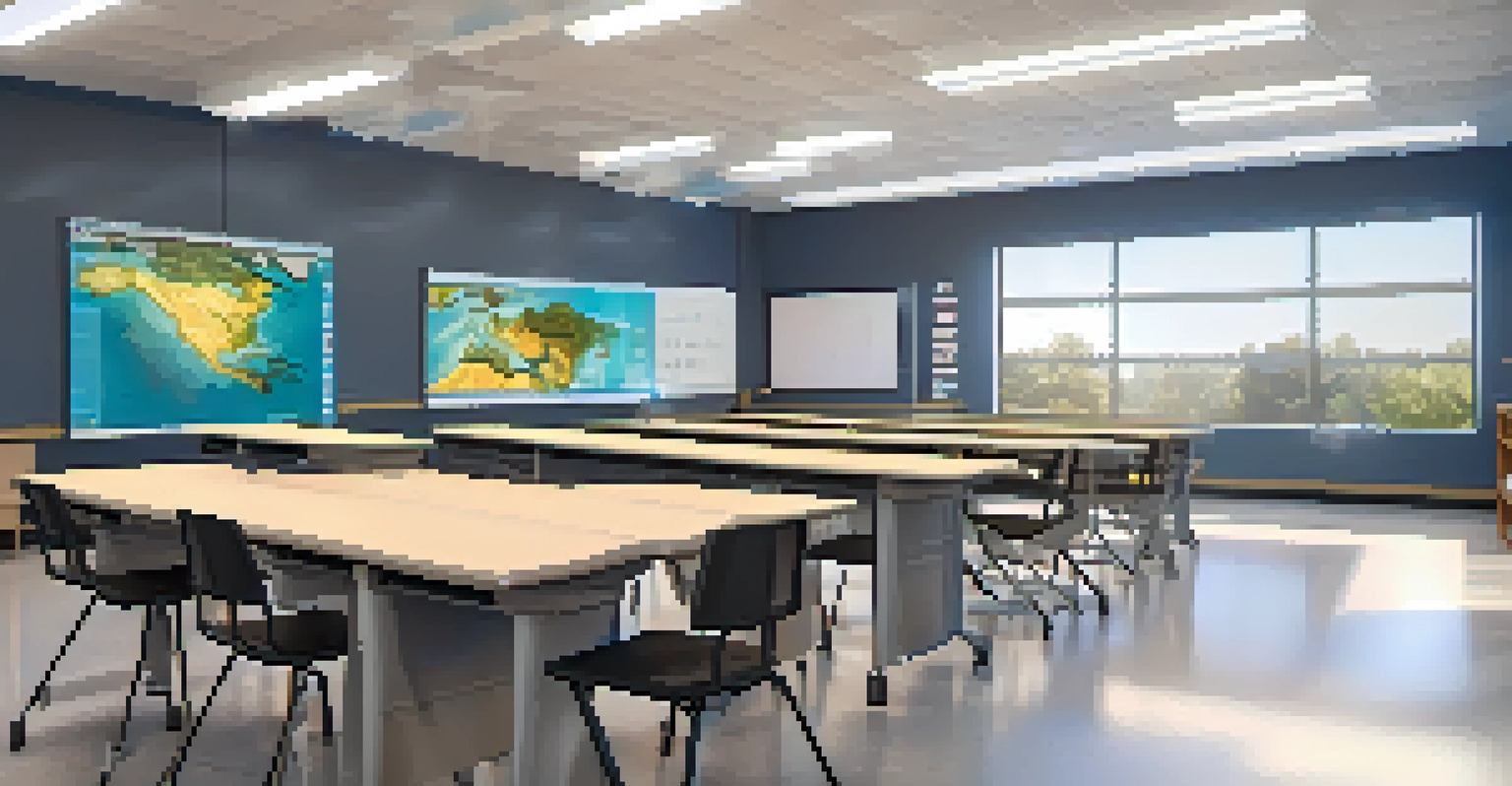Building a Skilled Workforce: Houston's Education and Research Focus

Houston's Commitment to Education and Workforce Development
Houston has long recognized that a skilled workforce is essential for economic growth. By investing in education and training programs, the city aims to equip its residents with the necessary skills to thrive in a competitive job market. Local government and educational institutions are collaborating to ensure that the workforce is not only skilled but also adaptable to changing industry demands.
Education is the most powerful weapon which you can use to change the world.
This commitment is evident in initiatives like the Greater Houston Partnership, which works to align workforce training with the needs of local businesses. By fostering partnerships between employers and educational institutions, Houston is creating pathways for students that lead directly to employment opportunities. This proactive approach not only benefits individuals but also strengthens the local economy.
Moreover, Houston's diverse economy, ranging from healthcare to energy, requires a broad range of skills. By focusing on educational programs that cater to these various sectors, the city is preparing its population for a future that is both dynamic and promising. Ultimately, this commitment to education and workforce development sets Houston apart as a leader in creating a skilled workforce.
The Role of Higher Education Institutions in Skill Building
Higher education institutions in Houston play a pivotal role in workforce development. Universities such as the University of Houston and Rice University offer programs that are tailored to meet the demands of the local economy. With a strong emphasis on research and innovation, these institutions are helping to cultivate a workforce that is not only knowledgeable but also capable of driving technological advancements.

Programs in fields like engineering, health sciences, and business are designed to provide students with hands-on experience, ensuring they are job-ready upon graduation. Internships, co-op programs, and industry partnerships allow students to gain real-world experience, making them more attractive to potential employers. This practical approach is crucial in a city where industries are constantly evolving.
Houston Prioritizes Workforce Skills
The city invests in education and training programs to ensure residents possess the skills needed for a competitive job market.
Additionally, the presence of community colleges such as Houston Community College further enhances skill-building opportunities. These institutions offer flexible programs that cater to adult learners and those seeking career changes, ensuring that education is accessible to all. By providing various pathways to success, Houston's higher education institutions are integral to building a skilled workforce.
Training Programs that Align with Industry Needs
One of the key strategies Houston employs to build a skilled workforce is the development of training programs that align closely with industry needs. By engaging with local businesses, educational institutions can create curricula that reflect the skills employers are seeking. This ensures that graduates are equipped with relevant knowledge that can be immediately applied in the workplace.
An investment in knowledge always pays the best interest.
For instance, training programs in information technology and advanced manufacturing are tailored to meet the specific demands of these rapidly growing sectors. By focusing on high-demand fields, Houston is not only addressing current workforce gaps but also preparing for future industry trends. This alignment fosters a more efficient job market where employers can find qualified candidates more easily.
Moreover, many of these programs offer certifications that enhance employability, giving graduates a competitive edge. The collaboration between educational institutions and industry leaders is a win-win situation, creating a pipeline of talent that benefits both the workforce and the local economy. Such initiatives underline Houston's proactive approach to workforce development.
The Impact of Research Institutions on Skill Development
Houston is home to numerous research institutions that contribute significantly to skill development. Organizations like the Texas Medical Center and the Houston Advanced Research Center are not only pushing the boundaries of innovation but also training the next generation of skilled professionals. Their research initiatives often lead to partnerships with universities, creating a synergy between education and practical application.
These institutions provide students and professionals with opportunities to engage in cutting-edge research, enhancing their skills and knowledge in real-time. For example, students involved in medical research projects gain invaluable experience that prepares them for careers in healthcare. This hands-on involvement in research fosters critical thinking and problem-solving skills that are essential in any field.
Higher Education Drives Job Readiness
Local universities provide tailored programs and hands-on experiences to prepare students for immediate employment in various industries.
Furthermore, research institutions often serve as incubators for new ideas and technologies, which can lead to job creation in emerging sectors. By linking workforce training with research opportunities, Houston is nurturing an environment of continuous learning and innovation. This interconnectedness between research and education strengthens the overall skill set of the workforce.
Community Engagement and Workforce Development
Community engagement plays a vital role in Houston's approach to workforce development. Local organizations and non-profits are actively involved in providing educational resources and training programs to underserved populations. By reaching out to diverse communities, these initiatives help to close the skills gap and ensure that all residents have access to quality education and job opportunities.
For example, programs focused on STEM (Science, Technology, Engineering, and Mathematics) education are particularly impactful, as they encourage young people to pursue careers in high-demand fields. By providing mentorship, scholarships, and hands-on learning experiences, community organizations are empowering the next generation to succeed. This grassroots approach not only benefits individuals but also strengthens the community as a whole.
Moreover, community engagement fosters a sense of belonging and collaboration, which is essential for sustainable workforce development. By involving local residents in the conversation, Houston is creating inclusive programs that address the unique needs of its diverse population. This collaborative spirit is a cornerstone of Houston’s strategy for building a skilled workforce.
Innovative Technology and Its Role in Education
Technology is transforming the landscape of education and workforce development in Houston. From online learning platforms to virtual reality training simulations, innovative tools are making education more accessible and engaging. These advancements allow students to learn at their own pace and provide them with opportunities to develop skills that are critical in today's job market.
For instance, many educational institutions are incorporating digital tools into their curricula, enabling students to gain experience with the latest technologies. This is particularly important in fields like information technology and engineering, where staying current with technological advancements is essential. By integrating technology into education, Houston is preparing students for the tech-driven world of work.
Community Engagement Bridges Skills Gap
Local organizations are actively involved in offering educational resources, particularly to underserved populations, fostering inclusivity in workforce development.
Additionally, technology facilitates collaboration between students and industry professionals, enhancing learning experiences. Online mentorship programs and virtual internships allow students to connect with experts in their field, providing invaluable insights and networking opportunities. This fusion of technology and education ensures that Houston's workforce is not only skilled but also well-prepared for the future.
Future Directions for Houston's Workforce Development
As Houston looks to the future, the focus on workforce development remains a top priority. With rapid changes in technology and industry needs, the city is committed to evolving its educational programs to stay ahead of the curve. This adaptability is crucial for ensuring that the workforce is equipped to meet emerging challenges and opportunities.
In particular, there is a growing emphasis on lifelong learning and continuous professional development. As industries evolve, workers must be willing to upskill and reskill to remain competitive. Houston's educational institutions are responding by offering flexible learning options that cater to adult learners and working professionals, making it easier for them to enhance their skills.

Moreover, the collaboration between government, educational institutions, and industry will continue to be a driving force in shaping the future workforce. By fostering these partnerships, Houston is creating a robust ecosystem that supports innovation and economic growth. With a forward-thinking approach, Houston is poised to maintain its status as a leader in workforce development.